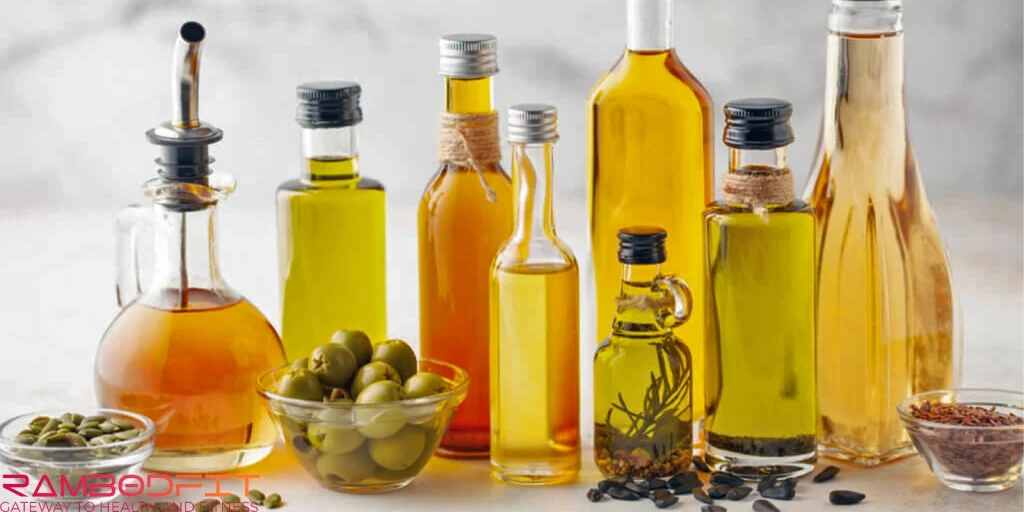


Let’s be real—there’s a bottle of something in your kitchen right now. Maybe it says canola. Perhaps it’s sunflowers, possibly corn. You reach for it when you want to fry something or, let’s be honest, when you’re pretending to bake instead of just eating cookie dough straight from the tub. It’s just oil, right? One of the most misunderstood seed oil health facts.
But then that little voice in your head starts up: “Aren’t seed oils and health enemies to each other? Isn’t that what’s causing all this inflammation? Didn’t that ripped guy on YouTube say it’s basically motor oil for humans?” Yeah, I used to buy into that too. Honestly, the internet’s been having a full-on meltdown over seed oils lately. TikTok, podcasts, Instagram “experts”—everyone’s blaming seed oils for everything from muffin tops to the apocalypse. This is where people often ignore real seed oil health facts.
Here’s the kicker on Rambodfit: most of us literally have no idea what seed oils and health even ARE, or what they do once they hit your bloodstream. So, let’s just cut the drama. I’m gonna walk you through what these things actually are, why people have lost their minds about them, and what actual science (not just gym bros) has to say. I’ll even throw in how I personally went from oil-phobe to someone who uses them, just, you know, smarter. Time to unpack the real seed oil health facts.
Table of Contents

Alright, quick and dirty: seed oils are just oils squeezed out of seeds. Groundbreaking, I know. They’re everywhere—your house, restaurants, every shelf in the grocery store. You know why? Cheap, flexible, and they don’t freak out when you crank up the heat. Still, they get a bad rap despite solid seed oils and health facts.
The usual suspects:
• Soybean oil
• Sunflower oil
• Canola (rapeseed) oil
• Corn oil
• Cottonseed oil (yeah, that’s a thing)
• Grapeseed oil
• Safflower oil
These dudes are packed with polyunsaturated fatty acids, mostly omega-6s (the infamous linoleic acid) and a dash of omega-3s (like ALA, for the nerds). That’s where so many seed oils and health facts get twisted.
Here’s a quick and dirty cheat sheet:
| Oil | Omega-6 (%) | Omega-3 (%) |
| Soybean | ~51% | ~7% |
| Sunflower | ~65% | ~0% |
| Canola | ~20% | ~9% |
| Corn | ~58% | ~1% |
| Cottonseed | ~52% | ~0% |
| Grapeseed | ~70% | ~1% |
See the trend? Loads of omega-6, barely any omega-3. That’s where all the drama starts. Let’s continue to dig through the seed oils and health facts.
This is the big one. The internet’s convinced: omega-6 makes you inflamed, your diet’s packed with ‘em, so now you’re basically a ticking time bomb. Seed oils and health inflammation = all disease. Seed oil health facts disagree with this.
Makes sense, right? Plot twist: science isn’t backing this up.
Yes, some omega-6 stuff (like arachidonic acid—don’t worry, no quiz later) can push inflammation. But your body’s smarter than that. It balances things out. And the real move isn’t to ghost omega-6; it’s to make sure you’re actually getting enough omega-3s in the mix. Balanced intake is one of the key seed oil health facts.
Science Drop:
There was a big review in Circulation (2021) that found bumping up linoleic acid (that’s omega-6) didn’t make people more inflamed. Swapping out some saturated fat for PUFAs cuts down inflammation markers and even lowers heart disease risk. Real-world data supports seed oil health facts.
My Hot Take:
I used to treat sunflower oil like it was radioactive sludge. Then I looked at my diet and realized I was just seriously lacking omega-3s. I started eating more flax, fish, and even tried some algae oil (tastes like pond, 0/10, but whatever). Suddenly, the “seed oil is evil” narrative didn’t add up. It’s not the oil—it’s the imbalance. That shift helped me understand seed oil health facts.
Here’s another crowd favorite: seed oils are “industrial sludge” because they’re made with hexane (yep, that’s a real chemical), high heat, and a bunch of refining steps. Super scary, right? Misleading info overshadows actual seed oil health facts.
Okay, so, yeah—most big-brand seed oils do get the hexane treatment and are refined to look pretty and not smell like old socks. It sounds gnarly, but the real question is: does any of that stuff stick around in the oil at levels that matter? Short answer: nah. The science clarifies these seed oil health facts.
Science Drop #2:
Hexane gets blasted away when they heat the oil. Studies show the leftovers are way below what the FDA or WHO even cares about. Plus, modern seed oils have almost no trans fats, especially if they’re not hydrogenated (which most aren’t these days). Which is exactly what seed oil health facts confirm.
Real-World Vibes:
Think about decaf coffee. They use solvents to strip out the caffeine, but nobody’s tossing their oat milk latte over it. It’s all about the dose and the context. The fear factor’s usually bigger than the actual risk. That context is critical to seed oil health facts.
Still paranoid? Go for cold-pressed or expeller-pressed oils. Those are more “natural” (whatever that means now) and skip the chemical stuff. You do you? Another option backed by seed oil health facts.

Alright, let’s squash this one real quick: just because two things happen at the same time doesn’t mean one’s making the other happen. Obesity’s gone up? Sure. So have TikTok binges, DoorDash orders, and the general art of sitting on our butts. To blame seed oils alone is like blaming your shoes for a bad marathon time when you never trained in the first place. This is a prime example of ignoring seed oil health facts.
Here’s the science-y bit (hang with me): a couple of legit studies from 2021 and 2022 didn’t just say seed oils aren’t killing us—they found swapping butter or saturated fats for seed oils lowers the risk of heart attacks and, well, dying in general. No, really. Once again, confirming seed oil health facts.
— “Replacing saturated fats with PUFAs, especially linoleic acid, is associated with lower risk of coronary heart disease.”
— “Higher PUFA intake was inversely associated with cardiovascular and total mortality.”
Now for a quick personal flex: when I was cutting (yep, trying to chisel that six-pack), I ditched coconut oil for canola. Fewer calories, less saturated fat. Guess what? I didn’t balloon up or drop dead. My cholesterol numbers got better. And no, I didn’t spontaneously combust from “inflammation.” Sorry, conspiracy theorists. Real-life results echo seed oil health facts.
Nope. Not even close. It’s not like all seed oils are members of some evil villain club.
Take canola oil—its omega-6 to omega-3 ratio is way better than corn or sunflower oil. Almost 2:1. Plus, it’s got a bunch of monounsaturated fats, which are basically the good stuff you get in olive oil. Grapeseed oil, on the flip side, is like 70% omega-6 and zero omega-3. Yikes. That diversity highlights crucial seed oil health facts.
Kitchen hack: Don’t marry one oil. Date around. Use canola or soybean oil for frying and sautéing. Save olive or avocado oil for your fancy salad dressings. Flaxseed or walnut oil? Great for boosting omega-3s if you’re feeling extra. The real trick: balance, not tossing out your whole pantry. Smart choices are part of smart seed oil health facts.
Ah, the romance of “natural” fats—people act like butter and coconut oil are the elixirs of the gods. Sure, they taste awesome, but that doesn’t mean they’re automatically healthier. Context matters, as shown by seed oil health facts.
Check this out:
| Fat | Saturated Fat (%) | Omega-6 (%) |
| Butter | ~51% | ~2% |
| Coconut Oil | ~82% | ~2% |
| Canola Oil | ~7% | ~20% |
Saturated fat? That stuff cranks up LDL cholesterol, especially if you’re unlucky in the genetics lottery. Swapping butter for seed oils isn’t selling your soul to Big Oil—it’s just looking out for your ticker. Clear comparisons like these strengthen seed oil health facts.
Short answer: Yep, if you want. They’re not magic, and they’re not poison. They’re just oils. The real game is how you use them and what the rest of your diet looks like. This balanced view sums up modern seed oil health facts.
What do I do? Canola for daily frying (cheap and balanced). Avocado oil if I’m feeling bougie and need high heat. Olive oil for salads, always. Flax oil, if I remember it exists (hello, omega-3s).
And I don’t forget my omega-3s: salmon, chia seeds, or algae oil sneak into my meals every week. Real-life applications rooted in seed oil health facts.
Bottom line? If you use seed oils with some common sense, they can totally fit into a healthy, modern diet. No fear-mongering necessary. Just straight-up seed oils and health facts.

Seed oils, man. People treat them like the nutritional boogeyman, but science just doesn’t back that up. They’re not evil—they’re just misunderstood. Like, use your head: don’t drown your salad in oil, but don’t freak out either. Best advice? Stick with the seed oil health facts.
Bottom line? Ignore the internet hype, check your actual health markers, and maybe chill out a little. The real danger isn’t canola or sunflower oil, it’s buying into the fear factory. Stay curious, eat smart, and don’t let some influencer tell you what’s “toxic.” Always check the seed oil health facts.
Further Studies
Cooking oil/fat consumption and deaths from cardiometabolic diseases and other causes: prospective analysis of 521,120 individuals
Nah, not if you’re eating like a reasonable human. Tons of research says omega-6s—like linoleic acid—don’t magically crank up inflammation. It’s all about balance with your omega-3s. You can’t just chug one and ignore the other, you know? Another myth debunked by seed oils and health facts.
Why would they? Seriously, unless you’re deep into some weird anti-oil cult, there’s no reason. Seed oils and health pack calories and help keep joints moving. Just mix it up, eat the rainbow, get those omega-3s in too. Recovery’s about balance, not banning stuff. Which aligns with seed oils and health facts.
Yeah, if you care about flavor and like to brag about purity. Cold-pressed keeps more of the good stuff and skips the chemical horror show. But hey, refined is cheap, safe, and totally fine for your fried eggs. Don’t overthink it. Choose what suits your lifestyle and seed oil health facts. Seed oils and health can be on the same page.